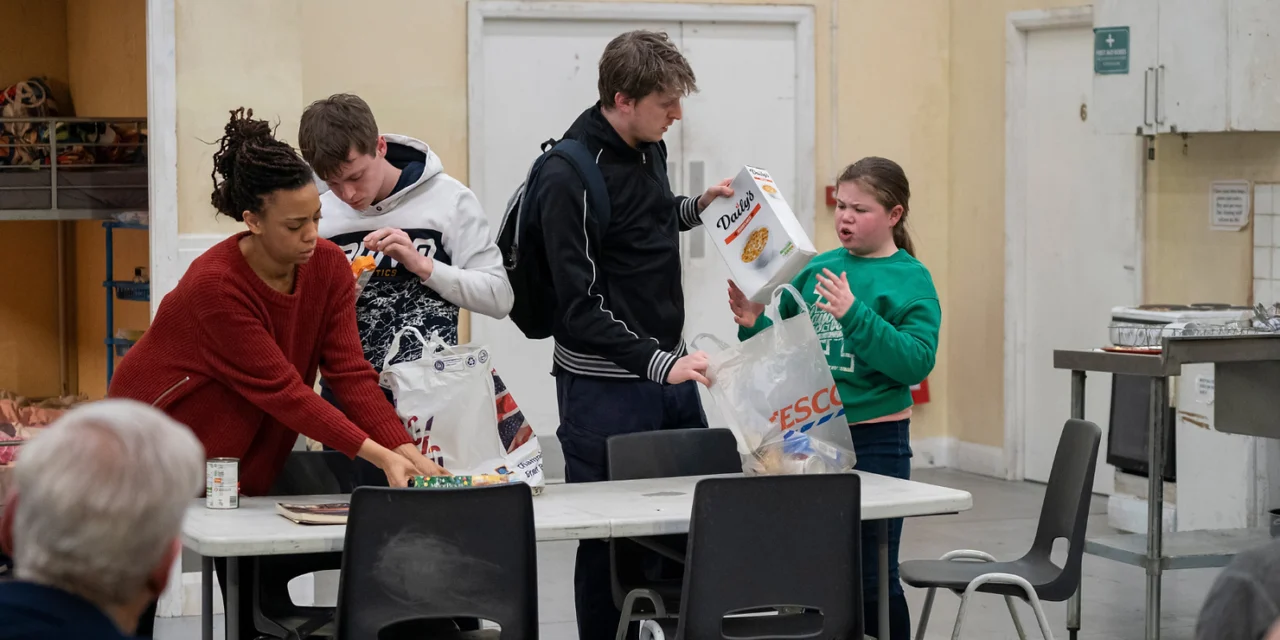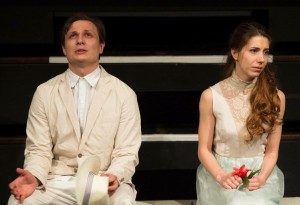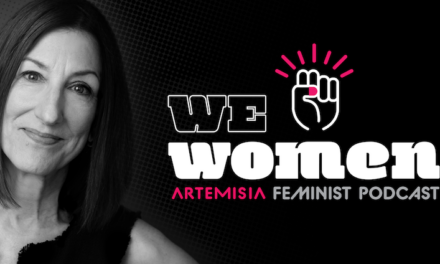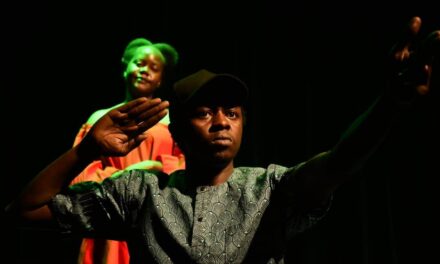Alexander Zeldin’s Love— a much-celebrated, quietly confrontational, British-devised piece from 2016 about homeless people living in a temporary shelter— is a noble piece of theater. It focuses on two families struggling with grim precarity, maddening bureaucratic delay, and indifference; telling an unsensational story about them mostly by way of minutely observed behavioral detail. The piece, now running at Park Avenue Armory, was made in collaboration with actual shelter residents (hence docudramatic detail), one of whom (a Sudanese refugee with no previous theater experience) is in the cast.
This is no analytical Brechtian exposé. Love doesn’t argue for any particular political policy change, or even trace any causes of the social ills it depicts. Its sole purpose is to generate empathy, using intimate, hyper-specific, realistic action to force us to feel uncomfortable feelings and see things that we’re experts at looking away from. Brecht, who thought all theater should clarify social causes, would have probably dismissed it as sentimental.
I’d read numerous admiring articles about Love from its pre-pandemic runs in London and elsewhere and I wish my reaction was as warm as other critics’ have been. Alas, the show didn’t have its intended effect on me, or on the diverse group of Hunter College students I went with…or, judging from the ubiquitous dozing and tepid applause I saw around me at the Armory, on many others.
Zeldin has described himself as a protégé of Peter Brook, whom he assisted between 2010 and 2014. Like Brook, he’s partial to stripped-down stages, abhors showbiz razzle-dazzle, and believes fervently in the Universal bonding power of a kind of anti-theatrical acting rooted in everyday behavior. (Much has been written about the contradictions inherent in Brook’s privileged white European quest for a universal theatrical idiom with the power to overcome all language and cultural boundaries.)
Zeldin, for his part, has been more modest, avoiding grand claims. After apprentice directing for several years in big professional theaters, Zeldin turned to workshopping pieces from scratch with unknown and non-professional actors chosen for their familiarity with various species of precarity he wanted to examine: housing eviction, low-wage gig work, the indignities of aging. He works through trust, getting vulnerable people to share their stories, quirks, fears, and indignities.
During the years he has worked this way, precarity—meaning any chronic insecurity inherent in neoliberal capitalism—has become a hot topic general in British theater. Zeldin has stood out in this crowded field (including Anders Lustgarten, Chris, Dunkley, Cardboard Citizens, and many others) for his stress on moment-to-moment lived experience (rather than analysis or allegorical storytelling) in pieces like Love, Beyond Caring, and Faith, Hope and Charity.
Love contains a lot of silence and aimlessness, true to the doldrum environments of all public shelters with their pointless and infuriating waits, self-protective isolation, and sundry other irritants. We see heavily pregnant Emma (Janet Euk), for instance, delicately maneuvering around the morning moods of her step-kids, trying to keep things upbeat while negotiating a bathroom queue, food refusal, and slow toothbrushing, all while nervous about her partner Dean’s (Alex Austin) impending visit to the local housing office. We then witness an obese, middle-aged, unemployed man named Colin (Nick Holder), who cares for his senile and incontinent mother Barbara (Amelda Brown), as he passive-aggressively corners Emma to pump her for personal info and overshares his own. This sort of thing dominates the production’s 90 minutes.
The material for Zeldin’s pieces is generated in improvisations, which he selects and edits, then publishes as dramas with his name on the title pages. I have some questions about this particular drama, as a ‘drama’.
A play like Love depends on drawing us in, on making us feel that its depicted suffering is palpable and proximate. To achieve that, it has to be close to us, not only physically, but also emotionally. It has to generate a kind of trust akin to that which Zeldin clearly won from his vulnerable collaborators—trust is the material’s truth, completeness, and relevance to our lives. That’s the only way to make us care and feel implicated—an especially steep challenge in America, where we have no welfare-state experience or expectations, and audiences may well wonder why such a play’s stories are so horrible when every character (unlike most of our homeless) has a roof, a functional kitchen, and a working bathroom.
So here’s one question (from one of my students, but I wondered too). Why does the play include two characters of color only to marginalize them as fleeting cameos? A Syrian, Adnan (Naby Dakhli), who speaks little English, and evidently exists to float in and out of sight—warned about fridge use, waved away when trying to share music from his phone. That’s about it. Except for a brief conversation entirely in Arabic he conducts with the Sudanese woman, Tharwa (Hind Swareldahab), Adan is a cipher. Tharwa gets more stage time but is comparably fragmentary. She pretty much amounts to a non-western woman rushed out of the toilet, accused of swiping a cup, then heard singing to her child over the phone. What child? Why the separation? Evidently, we’re not supposed to ask. Or we’re supposed to feel bad that no one else asks. Does this guilt effect really justify introducing non-white roles only to leave them minor and patchy?

PC: Stephanie Berger and Nurith Wagner-Strauss.
Another question: who gets to have full access to this play? None of the actors make any effort to project vocally in the Armory’s cavernous drill hall—they all murmur at a maddeningly low volume the entire time. Ym cash-strapped yet eagerly interested Hunter students and I were seated in rows J and K in a handful of 30$ seats made available for the first two preview performances only. From there we caught roughly 60 percent of the dialogue. We had to read the script afterward to understand many details. We envied the occupants of the few dozen ‘premium’ chairs arranged directly on the stage. No doubt those patrons heard every word, including the whispers. All the appreciative reviews of Love have marveled at the intimacy with the actors experienced from those seats (which at the Armory cost $154). In other words, this internationally renowned play about poverty and homelessness is fully apprehensible and enjoyable only to the wealthy in New York City.
Love, for me, maintains an unbridgeable distance. It’s not just the size of the performance space, but also the way storytelling is restrained to a fault—so resistant to contrived plotting that it feels sleepy and anemic. We track Emma’s anxiety about giving birth before her family gets their own place, Colin and Dean’s shame of being unemployed, and Barbara’s humiliated despair about being incontinent. Somehow, these matters never rise to be gripping; rather they hover and dally as informational. At least from row J, the play’s events remain interesting ideas generated in improv material that might have been molded into a genuinely compelling play by someone who cared a bit more than Zeldin apparently does about the craft of playwriting.
LOVE
By Alexander Zelden
Written through devising with the company
Park Avenue Armory
This article was originally published by Theater Matters on Match 9th, 2023, and has been reposted with permission. To read the original article, click here.
This post was written by the author in their personal capacity.The opinions expressed in this article are the author’s own and do not reflect the view of The Theatre Times, their staff or collaborators.
This post was written by Jonathan Kalb.
The views expressed here belong to the author and do not necessarily reflect our views and opinions.


















